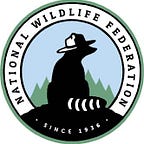Lessons about Life, Fishing and Public Lands from my Grandfather
Andrew Black, field director for public lands at the National Wildlife Federation, and an avid fly-fisherman who lives in Santa Fe.
“Shhh. Stop throwing rocks. You’re scaring the fish,” said my grandfather. Heeding this warning and watching him slowly wade up the river to sneak up on unsuspecting trout is one of my earliest childhood memories. I had just turned four and my grandfather — a salty but humorous World War II veteran — wanted nothing more than to teach his grandson how to fish. As I watched him quietly navigate the stream and approach the next fish, I was amazed how this environment seemed to be part of who he was: he was in harmony with the river and forest all around him. In the many subsequent fishing trips with him, I realized this was about much more than fishing.
My grandfather had stormed the beach at Normandy, survived the Battle of the Bulge and marched across France and Germany with General Patton, liberating Nazi concentration camps. He came home with a Bronze Star, a Silver Star and a Purple Heart. He also came back with the physical and emotional scars that come from encountering hell on earth. Being on the river, listening to the running waters and the silence of the forest became a place of healing for my grandfather. Our public lands and waters were a place he could reconnect with himself and the world around him. With each new cast came the potential of a fish of great beauty, size and wonder.
Through my elementary and teenage years this sense of beauty and wonder only grew as my grandfather and I traversed the country fishing every river, lake and ocean we came across. My sophomore year of college, my grandfather, who I affectionately called “Papa Bill” came down with Alzheimer’s. As his mind and body deteriorated, I flew home from college in Florida to say goodbye to my lifelong fishing partner and take him fishing one last time. Though he was wheelchair bound and had lost much of his memory, when I put him in front of the lake with a fishing rod in his hand, much to my amazement he instantly remembered how to cast and the next thing I knew he was reeling in fish after fish. That day, it again became apparent to me that fishing and being in nature was more than something my grandfather did, it was part of who he was and core to his identity. A few days later, my grandfather passed away.
As I grieved Papa Bill, public lands became an important place of healing and wholeness for me. In the solitude of river and through the silence of the forest, I recognized that America’s public lands were not only incredible places for outdoor recreation, solace, transformation, and spiritual reflection, but also were part of my grandfather’s legacy as a veteran and outdoorsman to ensure that all may enjoy and protect these lands for future generations to come. Indeed, this sense of legacy continues to fuel my passion for conservation of our public lands and why for the last decade I have served as a fly-fishing guide leading trips for disabled veterans and at-risk youth from diverse communities across the southwest. Although often considered the “teacher” on the river, our public lands and the amazing people I’ve encountered on these trips continue to be my greatest teachers allowing me to understand more deeply the rich and diverse tapestry of history, culture, and sacred traditions that are deeply woven into our collective American experience.
So many of our country’s parks and public lands written about in these love notes would not exist but for the Land and Water Conservation Fund. It’s why Congress should fund the program permanently. Follow the movement along at #FundLWCF. Learn more here.
…………………………………………………………………………………….
Would you like to write about public lands that you cherish? Please email Mary Jo Brooks at brooksm@nwf.org for guidelines.
